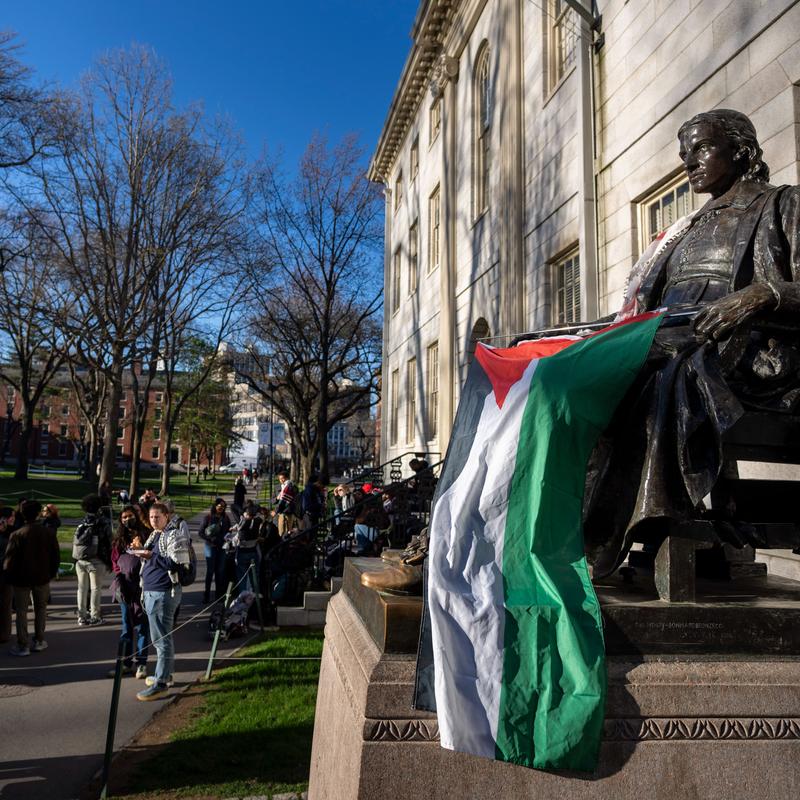[students chanting]
David Remnick: A week ago, protestors began occupying Harvard Yard at the center of the campus. They demanded that the university divest from Israel, among other actions. Administrators have threatened those students with sanctions, but so far they've held back from closing the encampments by force. I wanted to talk with one of those protestors, and I was put in touch with a leader of a pro-Palestinian group on campus. She asked to speak anonymously, citing concerns for her safety. She was among the students who signed a distinctly hardline statement that blamed Israel entirely for the Hamas October 7th attack.
Pro-Palestine Group Leader: Harvard Out of Occupied Palestine has three key demands that are really at our core of this movement, of the encampment at large, and those are for the university that we attend, being students and student workers, and affiliates of Harvard University, which is the largest, richest and wealthiest university in the country, with an endowment of $51 billion, is the financier of Israel and the occupation in Palestine.
I think at its core, our main focus is to amplify our demands of getting our university to disclose its investments in Israeli genocide and companies that are promoting that, and as well as divesting from all of such investments, and reinvesting in Palestinian cultures and academia. Then finally, dropping all the charges and all the disciplinary cases against students that have been organizing along this front.
David Remnick: What do you expect to see happen in the demonstrations at Harvard and Columbia and all across the nation going forward?
Pro-Palestine Group Leader: I think students are going very strong, and students are very adamant that they will not allow their university that they attend, and give money to, and work for, to benefit and profit off of genocide, and slaughter, and murder happening over in Palestine. What has been really inspiring for me as an organizer at Harvard is to see how students all over the country are facing ramped-up repression from their universities, including at Harvard University.
I think nearly 40 students received emails from the administrative board saying that they would potentially be faced with disciplinary charges for the university's disciplinary procedure process. Students will not let this suppression stop them. The students intend to continue until our demands are heard and met. We look forward to speaking with administration and making sure all those demands are met.
David Remnick: You signed a statement with other student groups just after the October 7th attack by Hamas, and it celebrated the attack and laid the blame for the violence entirely on Israel. There's no mention of murdered Israelis or hostages, and that struck many people as deeply, deeply problematic and antisemitic. Is there anything about that statement you would reconsider?
Pro-Palestine Group Leader: That letter and that statement that I still stand by and that many of the organizations, including PSC and AFRO still standby-- Obviously, no one likes the taste of blood. I think that no one celebrates generally the loss of life or violence for just violence's sake, but it acknowledges that the root cause of all this violence, and for anyone that feels compelled to see violence end in our world, we have to acknowledge the root cause of the violence.
The root cause of the violence goes back to 75 years ago, the forcible expulsion of 750,000 Palestinians from the land they have lived in for centuries. It only follows naturally that any and all violence that has occurred in occupied Palestine since then falls from that.
David Remnick: Look, as you know and I know, the history here is complicated and deep. It is not a simple matter, that the expulsion and the exile of Palestinians followed a war in which a number of surrounding Arab countries prosecuted a war after a partition plan was passed in the UN. What I'm asking you is when you don't acknowledge the killing of 1,200 Israelis, when you don't acknowledge the taking of hostages as anything other than having a root cause, do you understand why people might see that as coldhearted and antisemitic?
Pro-Palestine Group Leader: I definitely don't agree that it's in any way antisemitic. I think at Harvard, specifically, we've seen a really beautiful coalition of people from all backgrounds. This coalition includes many, many students of Jewish background and of Jewish faith. What we're doing and what we can control is what happens at our university, and I think our demands pertaining the university are most salient right now.
David Remnick: If those demands are not met, and graduation comes and goes and classes are over, will everybody stay on campus demonstrating, or will they go home?
Pro-Palestine Group Leader: Regardless of what happens, obviously it's inevitable that summer comes around, but I think that we're learning a lot of lessons, moving really quickly, and applying a lot of pressure now to get demands met immediately, and then continue to apply pressure if needed or if we feel need to be assessed back when we come back in the fall.
David Remnick: That's one of the student organizers of the occupation of Harvard Yard.
[music]
[00:05:50] [END OF AUDIO]
Copyright © 2024 New York Public Radio. All rights reserved. Visit our website terms of use at www.wnyc.org for further information.
New York Public Radio transcripts are created on a rush deadline, often by contractors. This text may not be in its final form and may be updated or revised in the future. Accuracy and availability may vary. The authoritative record of New York Public Radio’s programming is the audio record.
